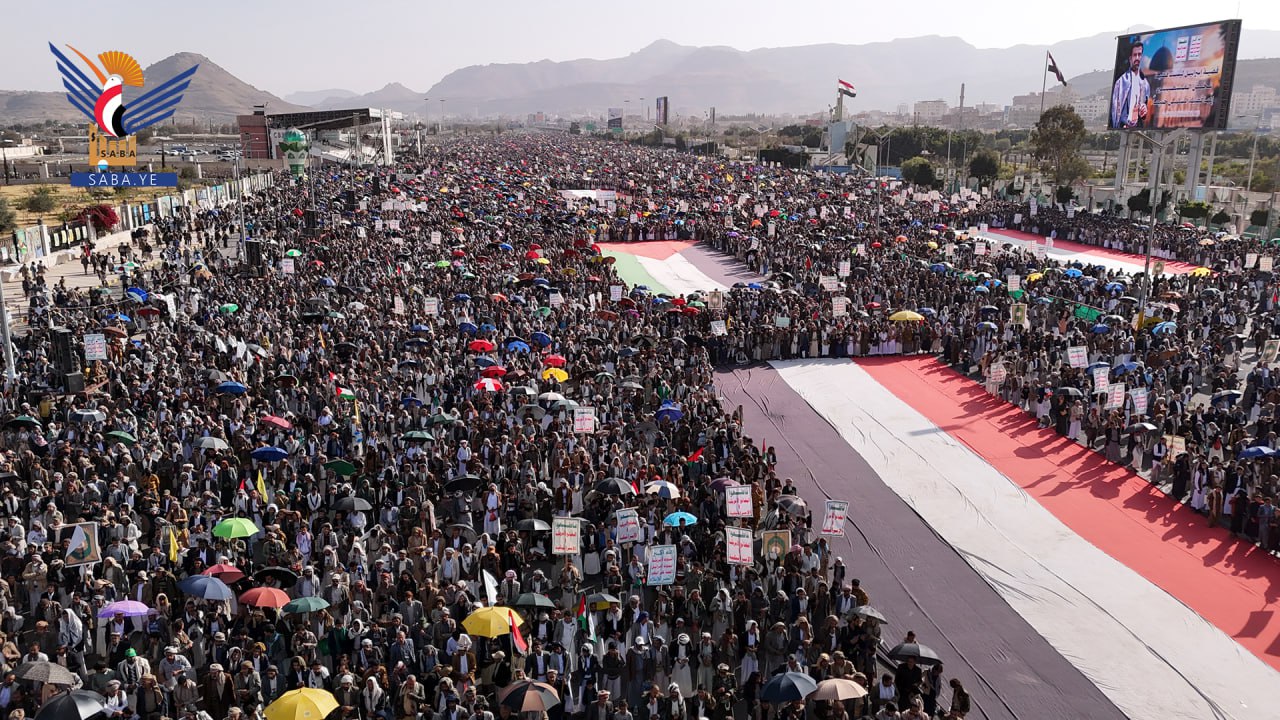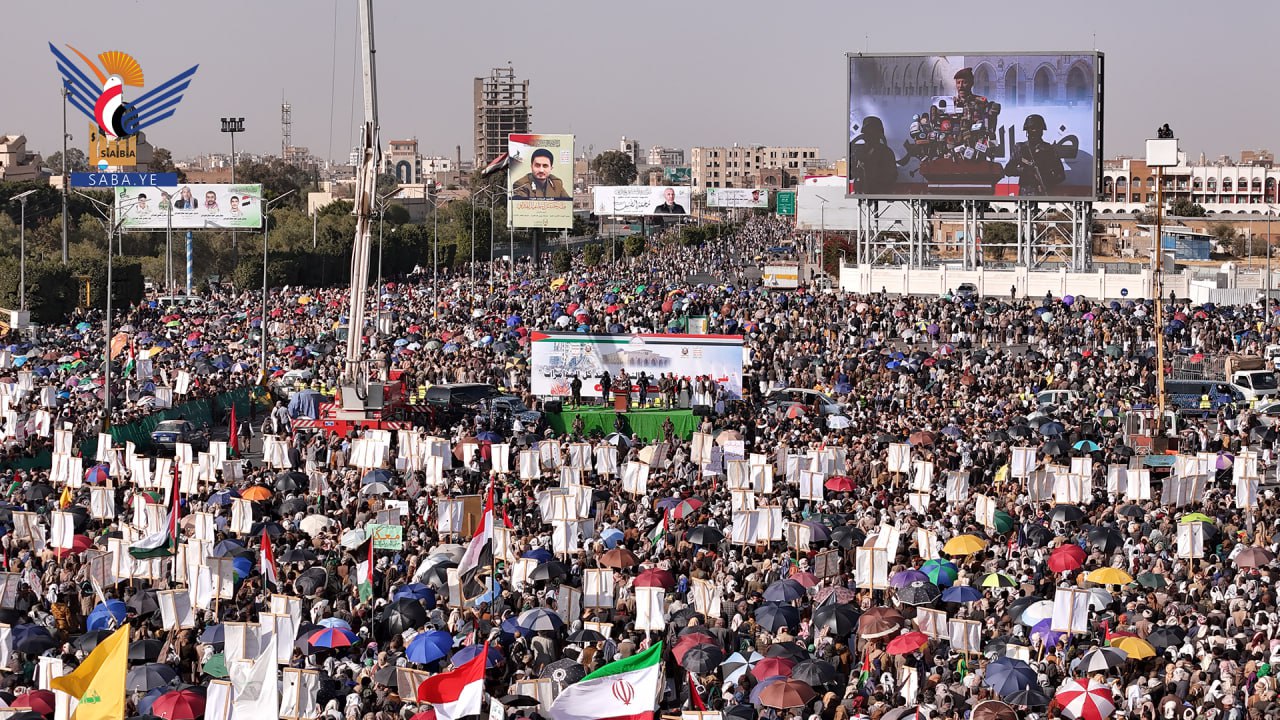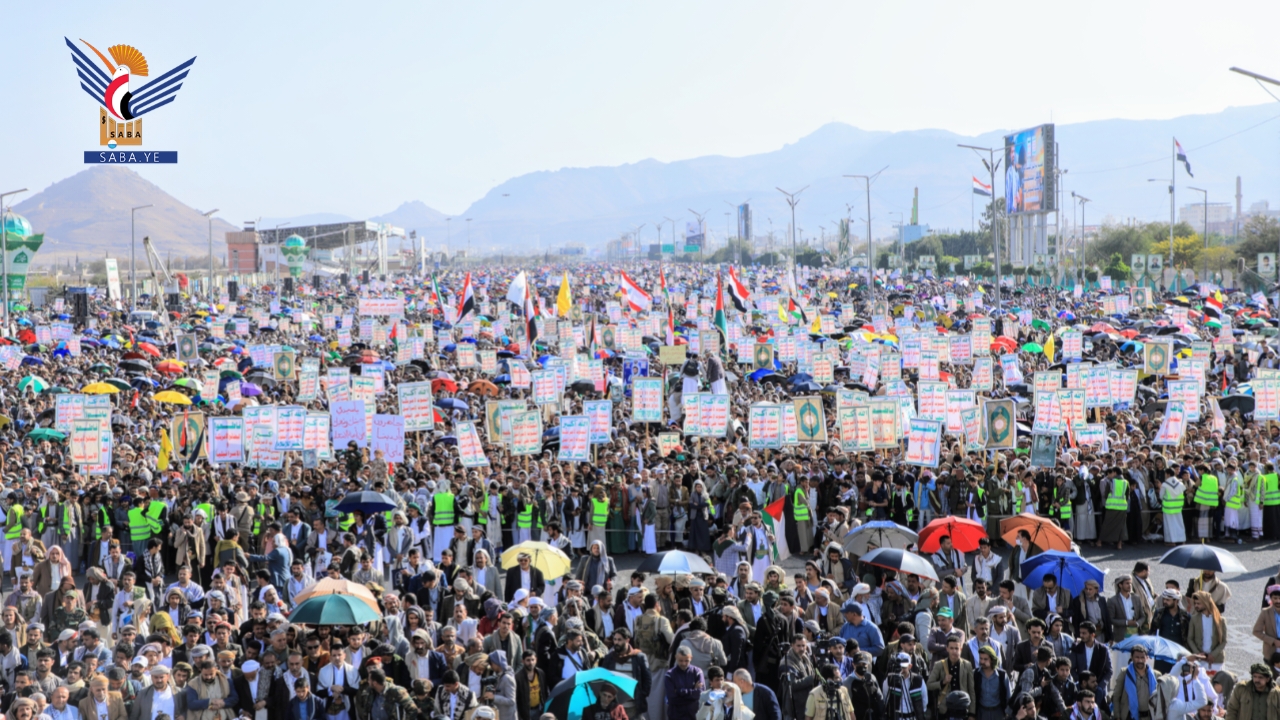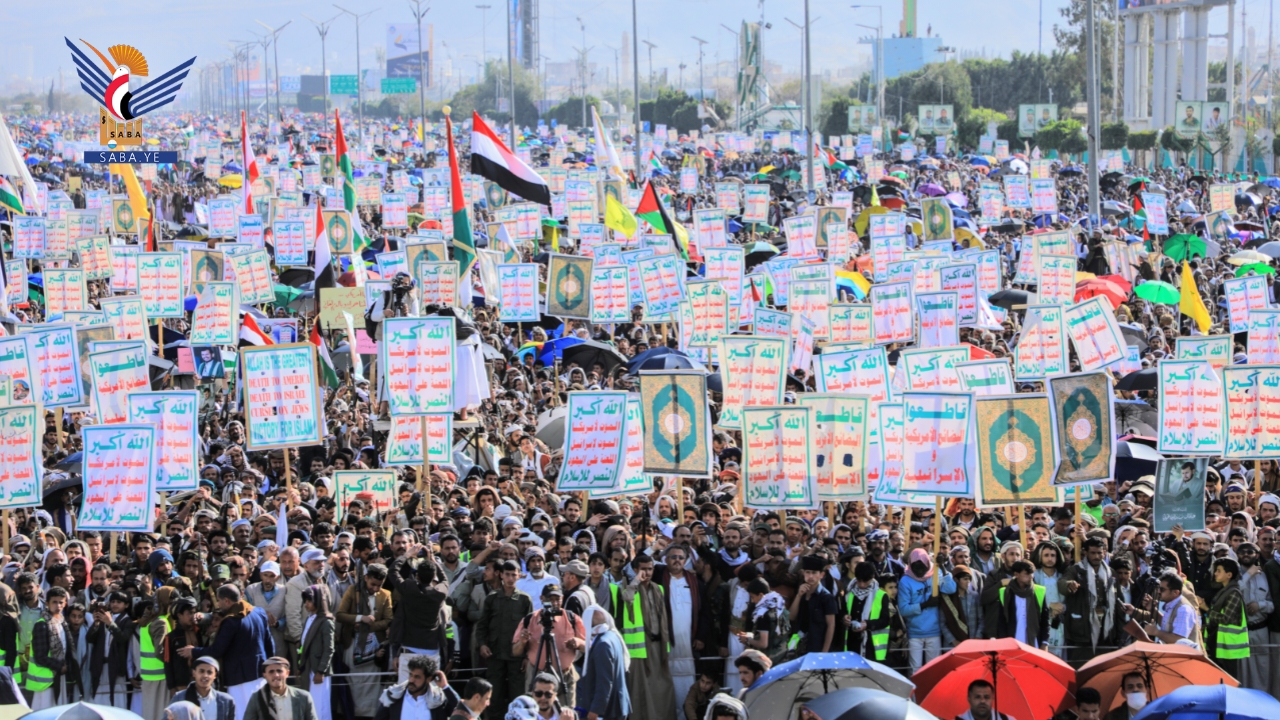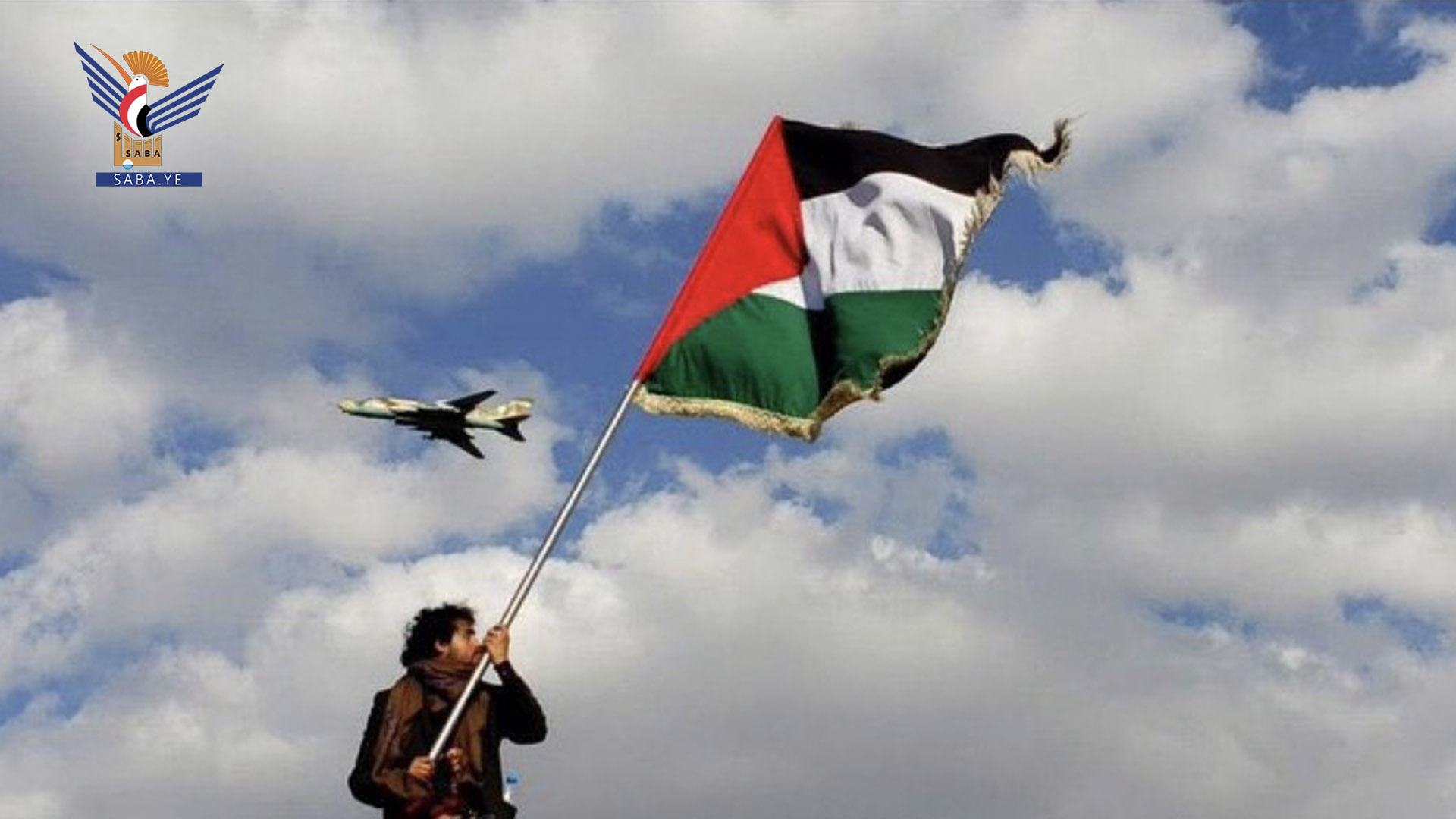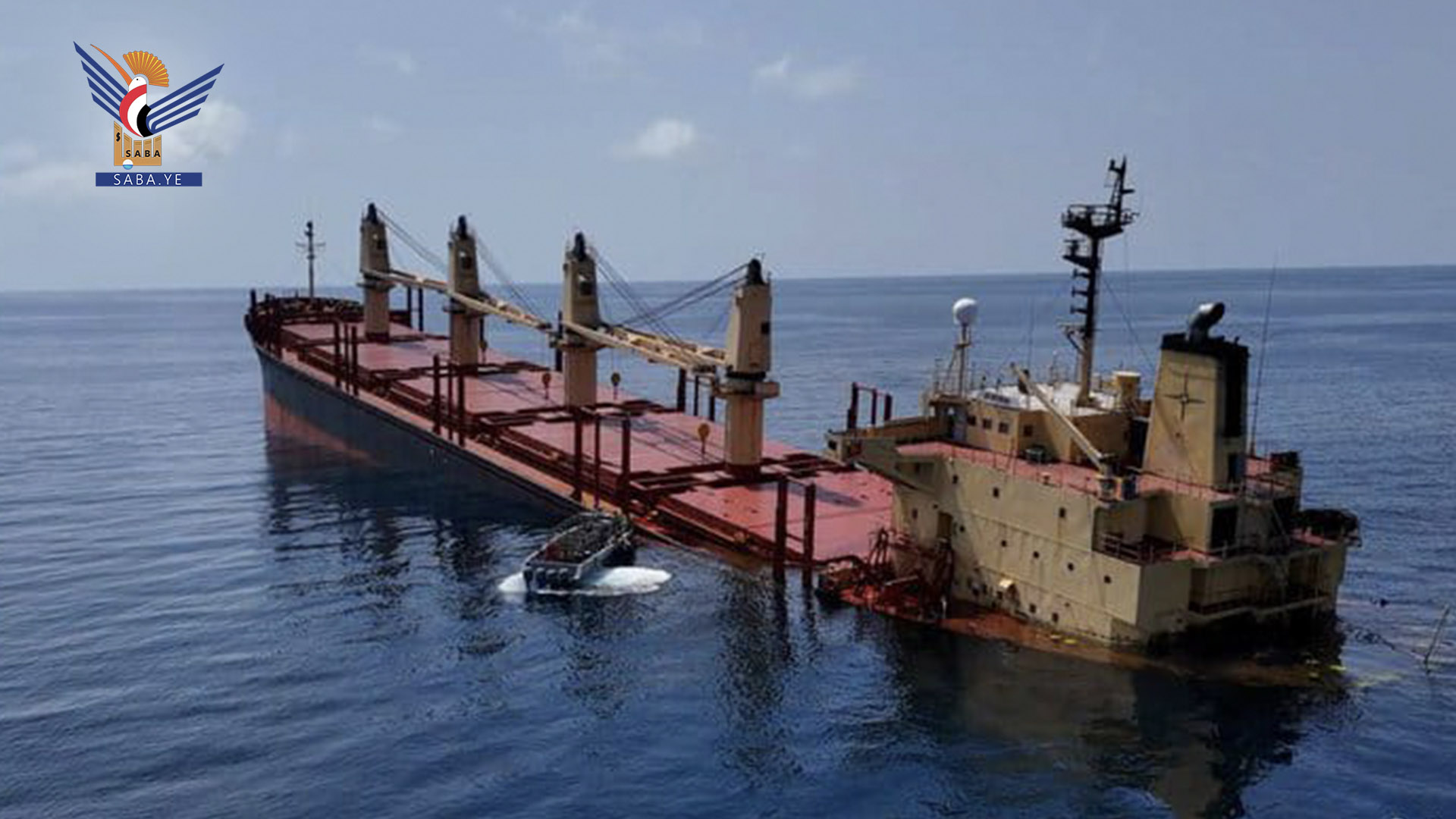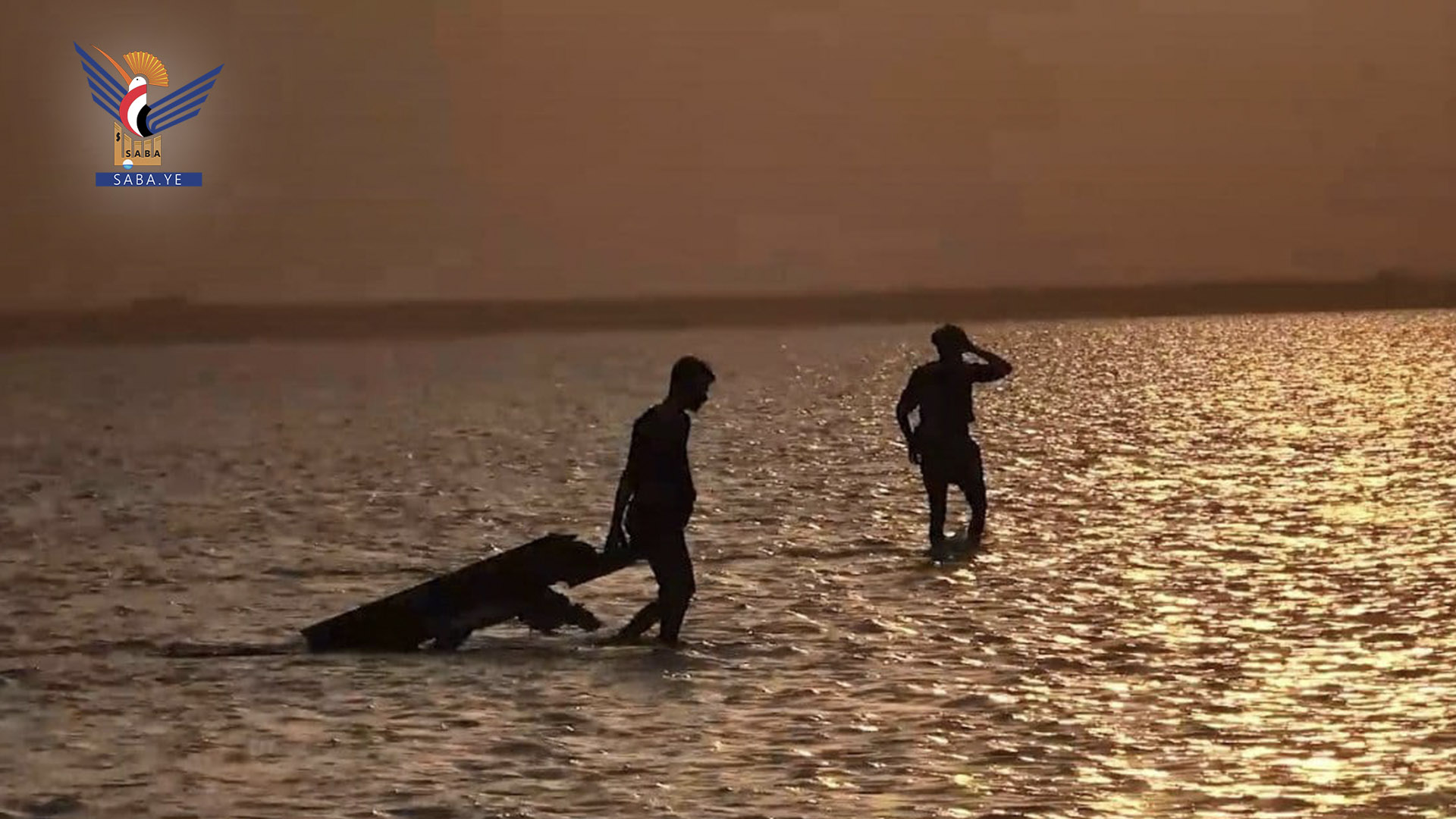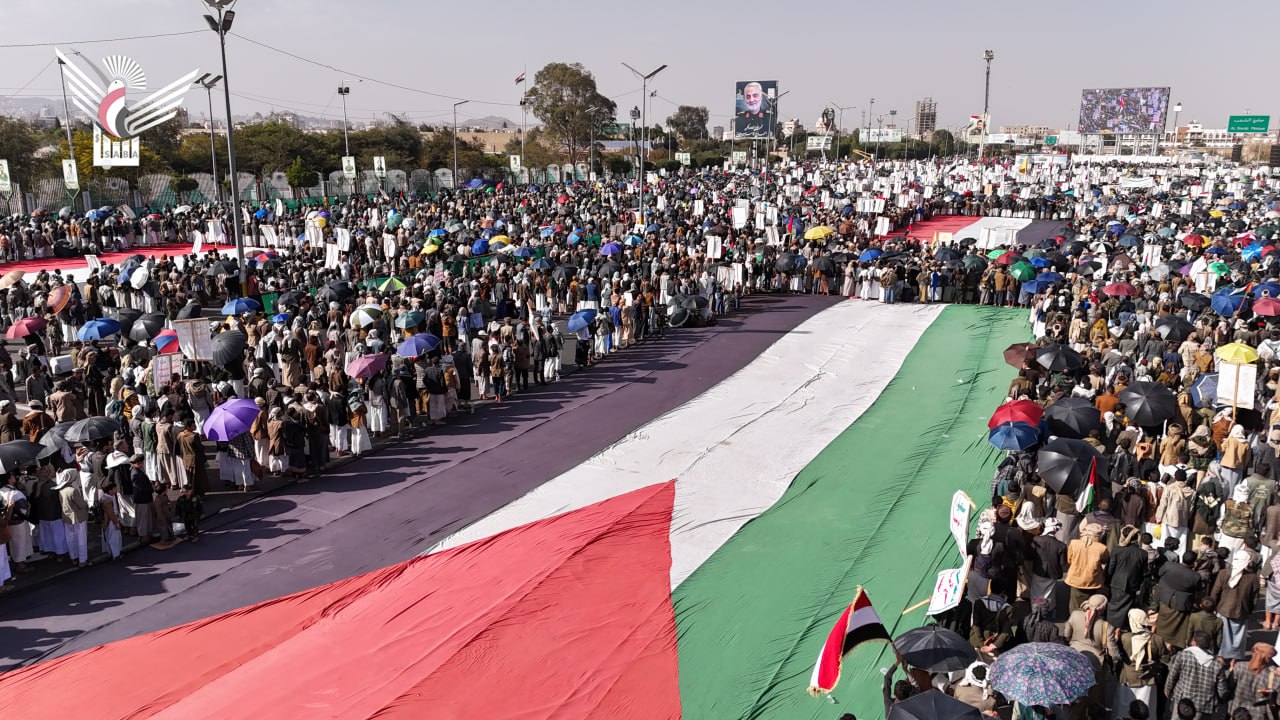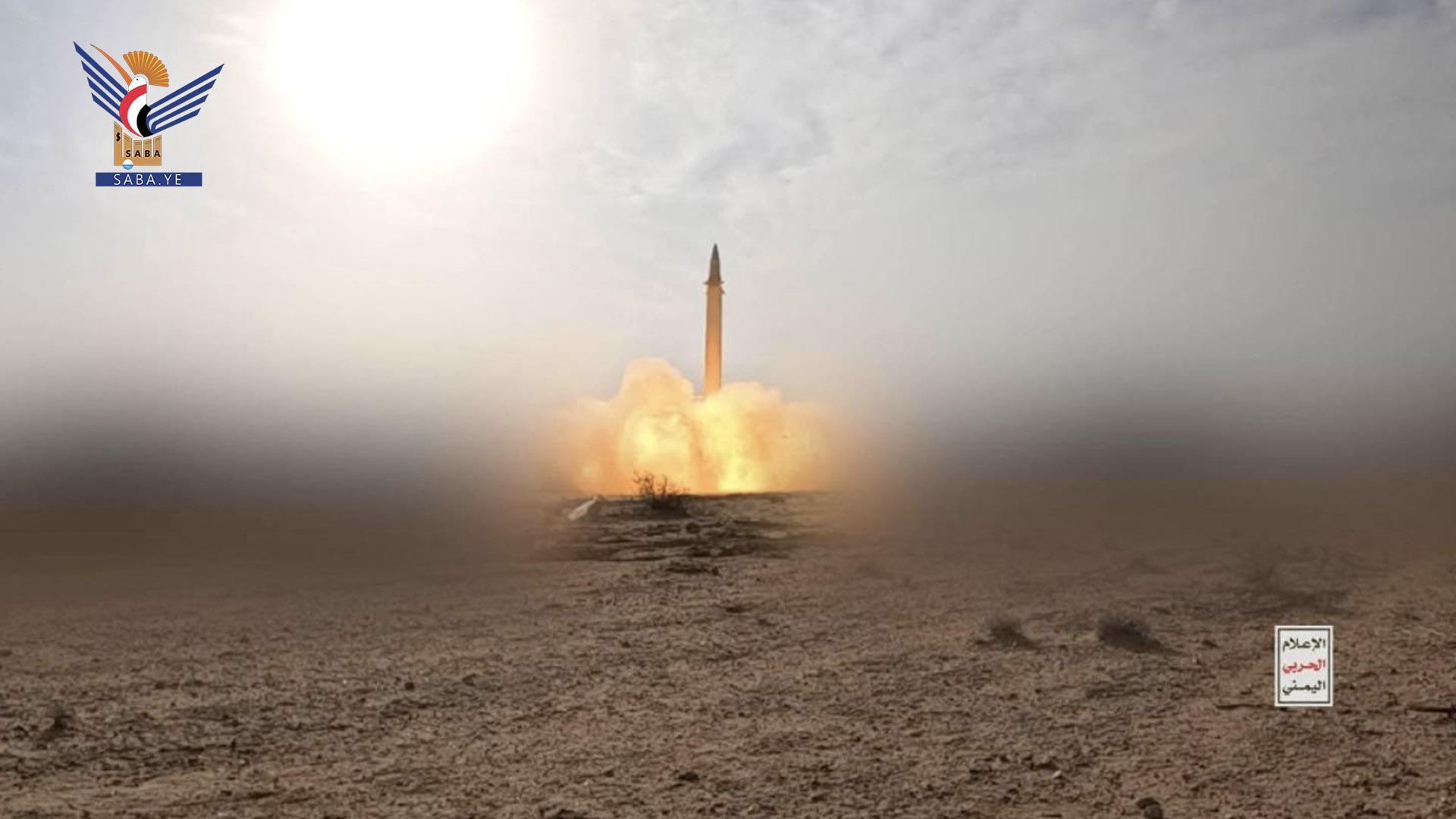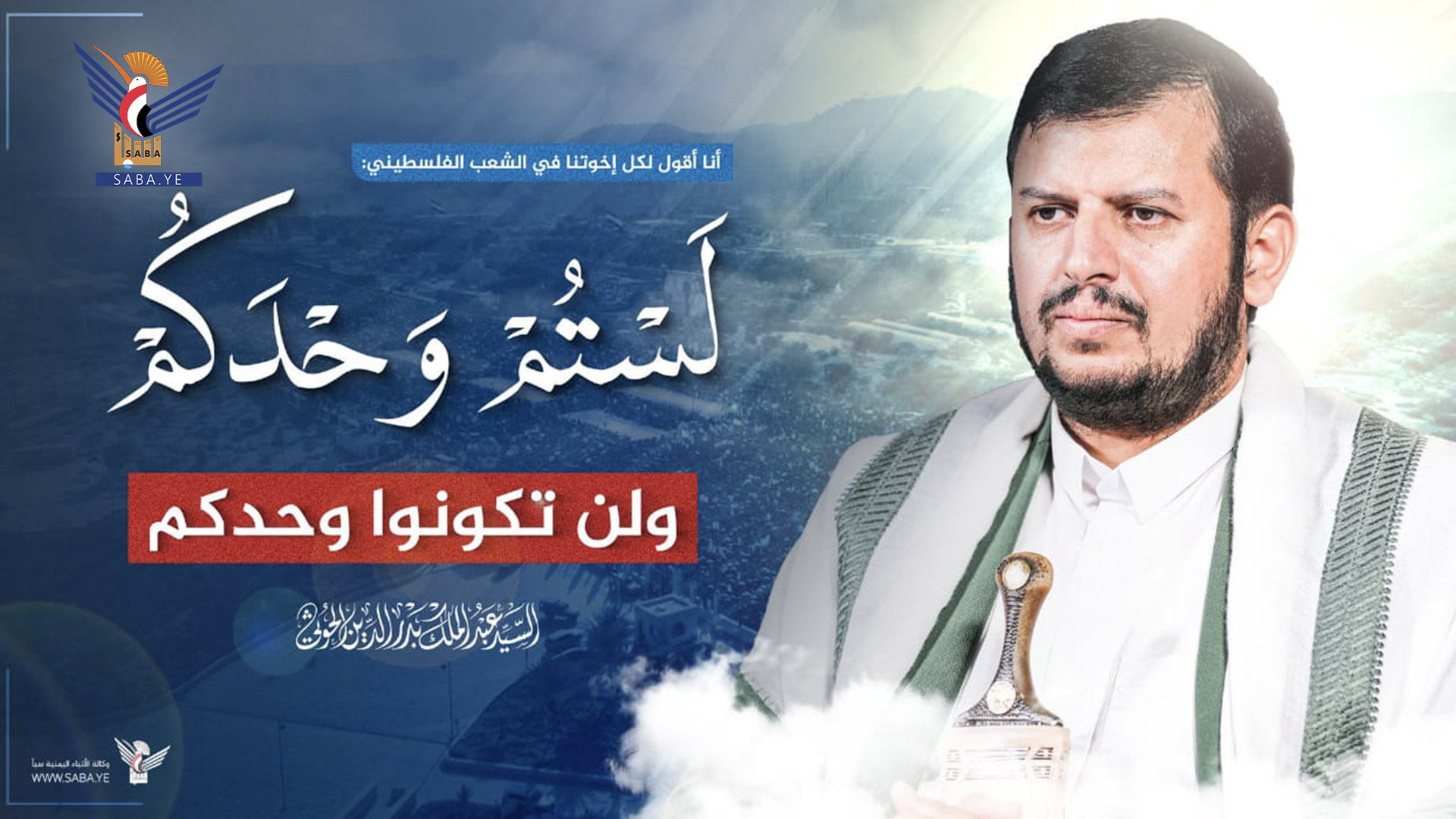
Sana'a - Saba:
In the midst of the political and military storms sweeping the region, and in light of the complicity of the normalization regimes and their submission to the American-Zionist hegemony, Yemen emerged with a historic scene and an exceptional position towards the issue of the nation of Palestine, embodying the strength of the Qur’anic project adopted by the Yemeni people and their wise and aware leadership.
Yemen's support for Gaza was not just a passing position or political propaganda, but rather a practical embodiment of the principles and values in which it believes, and a natural reflection of a firm faith that sees resistance as a duty and supporting the oppressed as a duty that is not negotiable.
God has blessed Yemen with a conscious and courageous leadership that takes the Qur’an as its curriculum and Islamic values as a fixed and unchanging approach. It is a solid leadership, headed by Sayyid Abdul-Malik Badr al-Din al-Houthi, who embodied through his positions the image of a true leader who does not fear the blame of anyone for God’s sake, and who is not deterred by challenges from the path of pride and dignity.
Since the beginning of the aggression on Gaza, the Yemeni voice was the clearest, the boldest and most influential position. While some Arab regimes threw themselves into the arms of the Zionist entity, Yemen was affirming that the Palestinian cause is not just a slogan, but a fundamental issue in its doctrine. This distinction did not come from nowhere, but from the blessing of the Qur’anic project that laid the foundations of pride, dignity and independence in the face of Western and Zionist projects.
At a time when indolence and submissiveness prevailed, the speeches of the leader of the revolution formed a road map for all free people in the region. They were not just words, but deep visions and a strategic reading of reality. Since the first day of the aggression on Gaza, the leader confirmed that the Yemeni people would not be neutral and would not be satisfied with condemnation and denunciation as the worn-out regimes do.
In one of his historic speeches, he described what is happening in Gaza as a real test of the sincerity of the Islamic nation, and explained how supporting the Zionist enemy in any way is a betrayal of the nation and a betrayal of values.
Under his wise guidance, Yemeni military operations were launched, drawing a new equation in the conflict with the enemy and confirming that support for Palestine can only be achieved through weapons and force, not through words and empty statements.
Since the start of the battle in Gaza, Yemen has not only issued threats, but has translated them into actions that have shaken the Zionist entity and confused its military calculations, with major military operations that targeted sensitive sites in Eilat (Umm al-Rashrash), and struck Israeli ships in the Red Sea. These operations have led to the disruption of the port of Eilat, and the disruption of shipping lines to the occupied ports, and have inflicted losses on the enemy amounting to billions of dollars.
These operations were not just a show of force, but a clear message that Yemen is capable of harming the enemy and forcing it to pay the price for its aggression, something that many Arab countries have not been able to do despite possessing a huge military arsenal.
The Zionist enemy did not expect that Yemen's hand would extend deep into its territory, but it was surprised by the inability of its defense systems to confront Yemeni missiles and drones, including the "Iron Dome" and "David's Sling", which the enemy has always boasted about, and which have proven their abject failure in the face of advanced Yemeni technology.
The precise strikes on Eilat, the cessation of port operations, and the sound of sirens in the settlements, all made the Zionist enemy realize that its security system is no longer effective, and that the Yemeni threat is real and cannot be ignored.
The Yemeni military operations went through five escalation stages, each stage representing a new development in the methods and type of weapons used. In the first stage, Israeli ships were targeted in a limited manner, the second targeted Israeli ports with long-range missiles, and in the third stage, advanced drones were used to strike the Zionist depth, while the fourth stage represented a strong threat against American interests and a direct confrontation with aircraft carriers, followed by the fifth stage with more precise and influential qualitative operations on the enemy.
Each stage represented a qualitative leap in the war, and each strike carried with it a message that Yemen held the keys to escalation, and that the more the aggression on Gaza increased, the more Yemeni attacks would increase.
With each operation, panic increasingly gripped the settlers in Eilat and the occupied southern regions, accompanied by a wide wave of flight from the targeted areas. This psychological terror caused by the Yemeni strikes had an impact that exceeded the direct military impact, and made the enemy feel that its internal security was no longer guaranteed.
The Yemeni strikes were not only directed at the Zionist entity, but also extended to include the American forces in the Red Sea. Despite all the aircraft carriers and destroyers that Washington possesses, it found itself helpless in the face of the Yemeni strikes, which forced it to change its course and recalculate its military calculations.
The escape of American aircraft carriers from the Red Sea, and the withdrawal of military battleships from the region, constituted a resounding scandal for the American administration, and proved that military power does not lie in the size of the arsenal, but in the will and trust in God.
Despite the economic blockade and the suffering experienced by the Yemeni people due to the repercussions of the aggression, this did not prevent them from standing with Palestine with everything they have, as the Yemenis went out in popular million-man marches in various governorates, to confirm that supporting Gaza is not a political choice but a religious and moral duty.
This popular commitment to the Palestinian cause, despite the difficult circumstances, demonstrated the vast difference between those who sell their cause under economic pressure, and a people who do not compromise on their principles even while living the consequences of the siege and the crisis.
Yemen was not just a supporter of Gaza, but it was the spearhead of a new equation that made the enemy reconsider its calculations. While some were rushing towards normalization, Yemen was drawing the features of a new future for the nation, in which the word would be for the free and the resistant, not for the submissive and the normalizers. It is the story of steadfastness, the story of Yemen that proved that honor cannot be bought, and that pride cannot be given but taken away.
In the midst of the political and military storms sweeping the region, and in light of the complicity of the normalization regimes and their submission to the American-Zionist hegemony, Yemen emerged with a historic scene and an exceptional position towards the issue of the nation of Palestine, embodying the strength of the Qur’anic project adopted by the Yemeni people and their wise and aware leadership.
Yemen's support for Gaza was not just a passing position or political propaganda, but rather a practical embodiment of the principles and values in which it believes, and a natural reflection of a firm faith that sees resistance as a duty and supporting the oppressed as a duty that is not negotiable.
God has blessed Yemen with a conscious and courageous leadership that takes the Qur’an as its curriculum and Islamic values as a fixed and unchanging approach. It is a solid leadership, headed by Sayyid Abdul-Malik Badr al-Din al-Houthi, who embodied through his positions the image of a true leader who does not fear the blame of anyone for God’s sake, and who is not deterred by challenges from the path of pride and dignity.
Since the beginning of the aggression on Gaza, the Yemeni voice was the clearest, the boldest and most influential position. While some Arab regimes threw themselves into the arms of the Zionist entity, Yemen was affirming that the Palestinian cause is not just a slogan, but a fundamental issue in its doctrine. This distinction did not come from nowhere, but from the blessing of the Qur’anic project that laid the foundations of pride, dignity and independence in the face of Western and Zionist projects.
At a time when indolence and submissiveness prevailed, the speeches of the leader of the revolution formed a road map for all free people in the region. They were not just words, but deep visions and a strategic reading of reality. Since the first day of the aggression on Gaza, the leader confirmed that the Yemeni people would not be neutral and would not be satisfied with condemnation and denunciation as the worn-out regimes do.
In one of his historic speeches, he described what is happening in Gaza as a real test of the sincerity of the Islamic nation, and explained how supporting the Zionist enemy in any way is a betrayal of the nation and a betrayal of values.
Under his wise guidance, Yemeni military operations were launched, drawing a new equation in the conflict with the enemy and confirming that support for Palestine can only be achieved through weapons and force, not through words and empty statements.
Since the start of the battle in Gaza, Yemen has not only issued threats, but has translated them into actions that have shaken the Zionist entity and confused its military calculations, with major military operations that targeted sensitive sites in Eilat (Umm al-Rashrash), and struck Israeli ships in the Red Sea. These operations have led to the disruption of the port of Eilat, and the disruption of shipping lines to the occupied ports, and have inflicted losses on the enemy amounting to billions of dollars.
These operations were not just a show of force, but a clear message that Yemen is capable of harming the enemy and forcing it to pay the price for its aggression, something that many Arab countries have not been able to do despite possessing a huge military arsenal.
The Zionist enemy did not expect that Yemen's hand would extend deep into its territory, but it was surprised by the inability of its defense systems to confront Yemeni missiles and drones, including the "Iron Dome" and "David's Sling", which the enemy has always boasted about, and which have proven their abject failure in the face of advanced Yemeni technology.
The precise strikes on Eilat, the cessation of port operations, and the sound of sirens in the settlements, all made the Zionist enemy realize that its security system is no longer effective, and that the Yemeni threat is real and cannot be ignored.
The Yemeni military operations went through five escalation stages, each stage representing a new development in the methods and type of weapons used. In the first stage, Israeli ships were targeted in a limited manner, the second targeted Israeli ports with long-range missiles, and in the third stage, advanced drones were used to strike the Zionist depth, while the fourth stage represented a strong threat against American interests and a direct confrontation with aircraft carriers, followed by the fifth stage with more precise and influential qualitative operations on the enemy.
Each stage represented a qualitative leap in the war, and each strike carried with it a message that Yemen held the keys to escalation, and that the more the aggression on Gaza increased, the more Yemeni attacks would increase.
With each operation, panic increasingly gripped the settlers in Eilat and the occupied southern regions, accompanied by a wide wave of flight from the targeted areas. This psychological terror caused by the Yemeni strikes had an impact that exceeded the direct military impact, and made the enemy feel that its internal security was no longer guaranteed.
The Yemeni strikes were not only directed at the Zionist entity, but also extended to include the American forces in the Red Sea. Despite all the aircraft carriers and destroyers that Washington possesses, it found itself helpless in the face of the Yemeni strikes, which forced it to change its course and recalculate its military calculations.
The escape of American aircraft carriers from the Red Sea, and the withdrawal of military battleships from the region, constituted a resounding scandal for the American administration, and proved that military power does not lie in the size of the arsenal, but in the will and trust in God.
Despite the economic blockade and the suffering experienced by the Yemeni people due to the repercussions of the aggression, this did not prevent them from standing with Palestine with everything they have, as the Yemenis went out in popular million-man marches in various governorates, to confirm that supporting Gaza is not a political choice but a religious and moral duty.
This popular commitment to the Palestinian cause, despite the difficult circumstances, demonstrated the vast difference between those who sell their cause under economic pressure, and a people who do not compromise on their principles even while living the consequences of the siege and the crisis.
Yemen was not just a supporter of Gaza, but it was the spearhead of a new equation that made the enemy reconsider its calculations. While some were rushing towards normalization, Yemen was drawing the features of a new future for the nation, in which the word would be for the free and the resistant, not for the submissive and the normalizers. It is the story of steadfastness, the story of Yemen that proved that honor cannot be bought, and that pride cannot be given but taken away.
